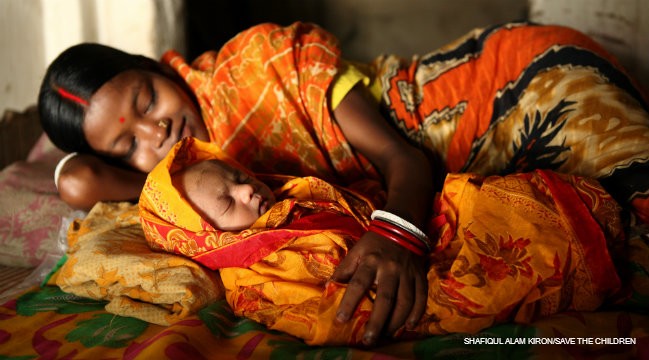
Since 1990, USAID has helped Bangladesh reduce maternal and child mortality by more than 60 percent and dramatically increase the use of family planning services. However, each year about 80,000 infants die during the first month of life and Bangladesh also has one of the highest tuberculosis rates in the world. USAID helps Bangladesh continue to reduce maternal and child mortality, increase the use of family planning methods, and improve nutrition.
While more than half of all Bangladeshi couples use modern methods of contraception, the Bangladesh government aims to increase contraceptive use to 72 percent, which will contribute to its goal of achieving below-replacement-level fertility of two children per woman by 2016. To this end, USAID works with local partners to ensure that men, women, and couples have access to high-quality reproductive health services. USAID and the government have also developed a public awareness strategy to promote the benefits of family planning, proper birth spacing, and contraceptives. We also conduct research to evaluate family planning programs and utilize innovative technology to maximize the reach and efficiency in providing reproductive health services.
High-quality family planning, health, and nutrition services remain limited in Bangladesh, particularly among poor people in rural areas, as well as overcrowded urban areas. In response, USAID integrates family planning, nutrition, and maternal, newborn, and child health services into a package of basic healthcare available in clinics throughout the country. This one-stop-shop approach also provides nutritional supplements for pregnant women and young children, and promotes exclusive breastfeeding for infants during the first six months of life.
To continue gains made in maternal and child health, USAID trains community health workers and clinic staff to help them provide high-quality care during childbirth. USAID outreach and mobile health initiatives also encourage pregnant women and their families to ensure they attend antenatal checkups and give birth under the supervision of a skilled health worker.
USAID assists Bangladesh to strengthen its public health systems with an emphasis on improving primary healthcare delivery at the community level. At the national level, USAID programs work with public health leaders to improve policy and planning, financial management, monitoring and evaluation, procurement, and logistics.
We also support the government’s national tuberculosis (TB) program, providing financial support and technical assistance to upgrade TB laboratory technology – including GeneXpert rapid testing. USAID assistance also helps Bangladesh procure drugs to treat multidrug resistant TB patients and develop a mobile phone application to treat TB patients in their communities.
In 2015, USAID programs in Bangladesh:
- Provided more than 30 million health service consultations through extensive network of nearly 400 NGO clinics, 10,000 satellite clinics, and 7,300 community health volunteers.
- Utilized mobile technology to reach more than 1.5 million regular subscribers with crucial health information about vaccinations and proper nutrition.
- Introduced technology to help Bangladesh detect deadly multidrug-resistant tuberculosis within two hours, reducing the overall average delay of diagnosis-to-treatment from 11 days in 2014, to 6 days.








Comment
Make a general inquiry or suggest an improvement.